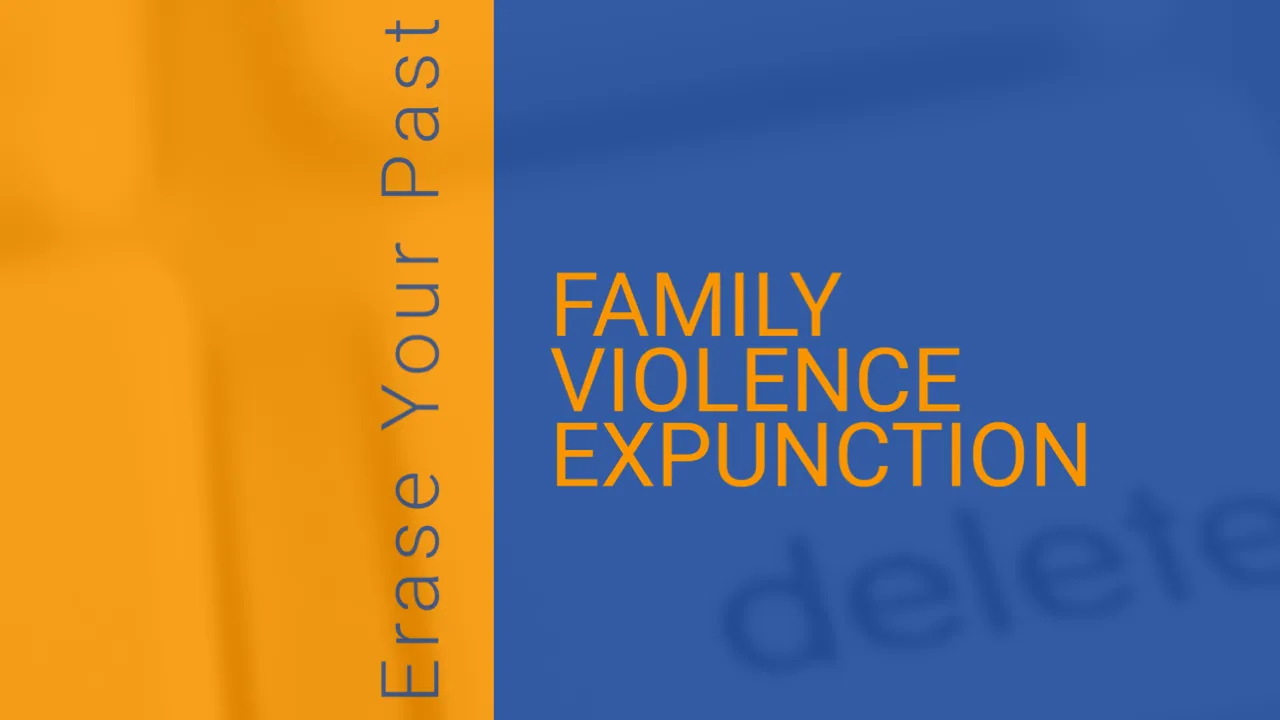Family Violence Expunction Key Takeaways
- An expunction orders all entities in possession of an arrest record to destroy it.
- After a judge grants an expunction order, you may legally deny the arrest ever took place.
- Assault family violence cases must be resolved in specific manners to become eligible for expunction.
- You must file for an expunction. They do not happen automatically.
- Keep a copy of your expunction order for the rest of your life.

What is Family Violence?
Texas Penal Code Section 22.01 describes several of the ways by which the State of Texas may prosecute someone for assault. When law enforcement accuses someone of assaulting a person with whom they have a relationship characterized by Chapter 71 of the Texas Family Code, police file charges for assault family violence. Assault family violence offenses range from low-level Class C misdemeanors punishable by fine only all the way to second-degree felony charges punishable by 2 – 20 years in prison.
Why Do I Need a Family Violence Expunction?
Whenever police place someone under arrest, the arrestee acquires a criminal background. With assault family violence cases, emergency protective orders and bond conditions go into a public safety report database. The Texas Department of Public Safety (“DPS”) obtains arrest records, booking information, and court disposition data, and the DPS distributes that criminal record information to to various state and federal law enforcement entities as well as private purchasers. These private purchasers of criminal background information provide records for private employers when they run criminal background checks on prospective employees.
When prospective employers see a family violence case in a prospective employee’s background, they often assume the worst. Many schools will not allow parents to volunteer at school-related functions when the parent has a family violence arrest in their background. And sadly, most people do not know how to interpret criminal record data. For example, schools and employers often do not understand the difference between the forms of contact or degree of injury associated with different assault family violence offenses. They may also misinterpret court data and not realize that prosecutors dismissed a bad case.
Family violence expunctions destroy those records. Expunctions make it to where employers and schools, for instance, do not see the assault accusation in your criminal history. They prevent you from having to perpetually answer new questions about a prior accusation. And in the event someone questions you about an expunged arrest, the law allows you to legally deny the arrest ever took place.
Family Violence Expunction Eligibility
Not every assault family violence arrest will become eligible for expunction. You must resolve your family violence case in one of the following ways:
- Prosecutors dismiss or refuse the case.
- Prosecutors reduce a Class A misdemeanor or felony offense to a Class C misdemeanor and agree to deferred adjudication.
- The case originates as a Class C misdemeanor and prosecutors dismiss the case or offer a deferred disposition.
- You successfully complete a pretrial diversion program in a county where the District Attorney’s Office offers pretrial diversion for assault family violence cases.
- A grand jury no-bills a felony assault family arrest.
- You are acquitted at trial.
- There are no additional charges arising out of the same arrest that are not also expunction eligible.
When Can I File for a Family Violence Expunction?
Article 55.01, Texas Code of Criminal Procedure, provides for the right to expunge criminal record information. If you win at trial, you become eligible to file your family violence expunction immediately. Assault family violence cases that originate as Class C misdemeanors may be eligible for expunction after 180 days have elapsed since the offense date so long as any deferred disposition period has expired and there are no other ineligible charges arising out of the same arrest.
For all other scenarios listed above, you will become eligible for a family violence expunction once the statute of limitations expires. As of September 1, 2023, misdemeanor assault family violence arrests have a statute of limitations that expires three years from the offense date. Texas law provides for a five-year statute of limitations for felony assault family violence arrests.
While it is possible for prosecutors to agree to a discretionary expunction before the statute of limitations expires, in our experience they rarely do with assault family cases due to the concern that domestic violence may recur in the future. Even if the prosecutors agree to an early, discretionary expunction, the judge also has discretion whether to grant the expunction. However, once the statute of limitations expires, assault family violence cases resolved in a manner described above will have a statutory right to expunction.
Expunctions Do Not Happen Automatically
Once your arrest becomes eligible for expunction, you must file a petition and proposed order for expunction. The petition and order must name all entities whom the court will order to destroy their records. You must pay the appropriate filing fees to the district clerk in the county where the assault arrest occurred. After filing the appropriate documents and paying all required fees, the expunction process will take a minimum of sixty (60) days.
Once you receive a copy of your expunction order, you will want to keep a copy of that order for your records. In the event some website still has your court record posted for public view, you can send them a copy of your expunction order. Texas law requires entities to destroy criminal record information in their possession once the entity receives notice of the expunction order. Failure to immediately destroy, delete, or take down expunged criminal record information constitutes a Class B misdemeanor and can result in civil penalties as well.
Do You Need an Expunction?
Contact our experienced family violence attorneys today. We can evaluate your case, determine if and when your assault family violence arrest will become expunction eligible, and we can help file the necessary paperwork to erase this incident from your past.


